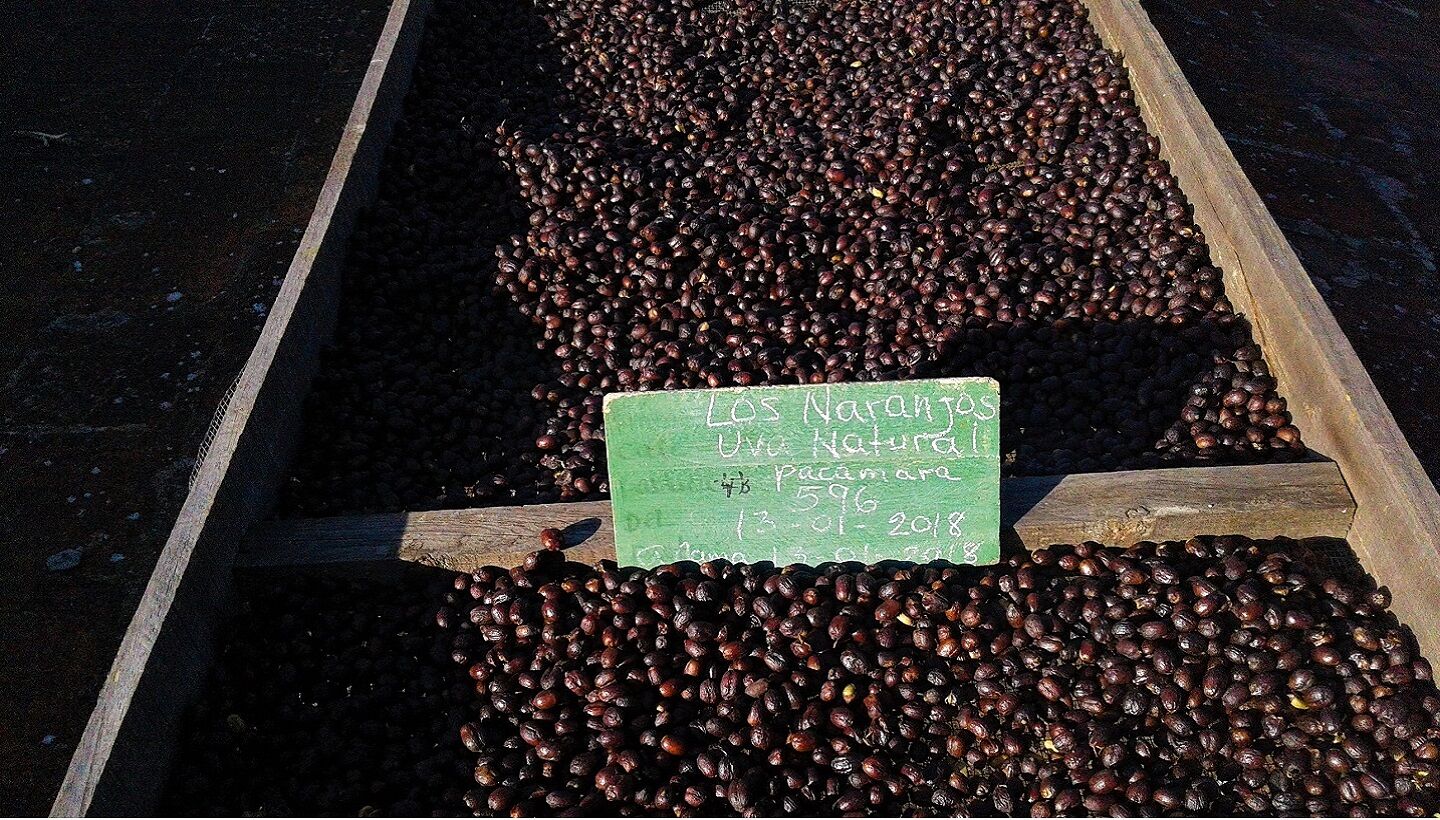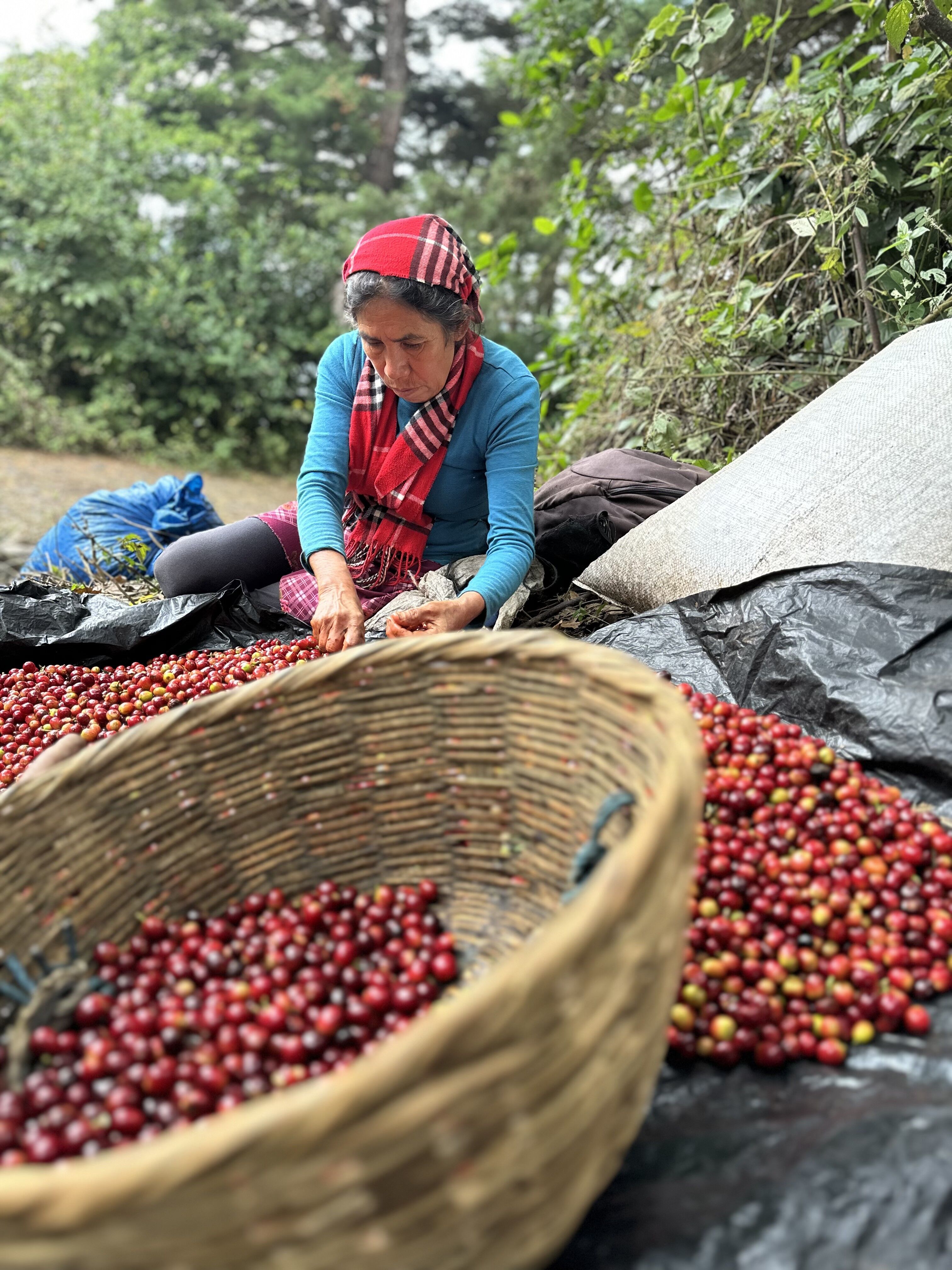Los Naranjos
El Salvador - Sonsonate - Naranjos - Geisha - Honey Anaerobic
GeishaHoney Anaerobic
Pick your crop :
Aromatic notes:
Spot price
€/kg
How is this coffee processed?
Los Naranjos is a picturesque municipality located in the mountainous Apaneca-Ilamatepec mountain range, on the border between Sonsonate and Ahuachapán department, El Salvador, at an altitude ranging between 1,000 and 2,050 meters above sea level. This municipality is part of the well-known Ruta de Las Flores, a tourist route that connects several municipalities in the western region of the country.
Years ago, these lands were dedicated almost exclusively to coffee production. However, coffee left behind more than just an economic legacy—it helped shape the development of the town. Many early coffee producers contributed to the community by donating land and resources for schools, churches, and other institutions that still serve the region today.
Los Naranjos Café was founded in 2015 and, initially all of its production was outsourced until Los Naranjos coffee mill was built in 2019. Since then, the company has been responsible for carrying out the entire process, from harvesting, processing, and finally exporting.
Los Naranjos farm is composed of 5 different varieties: Pacas (20%), Pacamara (10%), Borbón (10%), Gesha (10%) and Catimor (50%).
This farm is herbicides – free. Pure REGENERATIVE AGRICULTURE.
Marketing tools & Certifications
POS displays, postcards, QR codes for packaging, ...
- El Salvador
Origin
Region
Sonsonate - Los Naranjos
Producer
Species
Arabica Variety
Geisha
Process
Honey Anaerobic
Drying
25 days drying beds
Packaging
35kg - Jute bags
Altitude
1450 - 1750 Harvest period
December - March Type of harvest
Manual
The region Sonsonate
Since the introduction of its first seedlings in the 1740s, Arabica coffee cultivation initially reached Ahuachapán, Santa Ana, and Sonsonate, encouraged by agrarian colonialism, which, between 1870 and 1930, promoted the expulsion of communal lands in favor of a landed elite, the so-called 14 families, consolidating itself as the country's economic foundation. In Sonsonate, especially in municipalities such as Juayúa, Izalco, Salcoatitán, and Nahuizalco, coffee became the local economic backbone, generating employment and increased population on coffee farms and in processing plants.
In terms of production, Sonsonate has been part of the country's so-called western coffee mountain range, providing high-quality coffee, especially shade-grown varieties like Bourbon and Pacas. Despite this, recent decades have been marked by a severe crisis: diseases like coffee rust, climate change, low profitability, and the abandonment of farms have significantly reduced production and employment in the area.
From an environmental perspective, the shade – grown coffee plantations that predominate in Sonsonate function as forests, capturing carbon, regulating watersheds, and preserving biodiversity. Nearly 95% of the crops are shaded and provide approximately 7.8% of the national vegetation cover.
Today, coffee farms not only generate income and temporary and permanent employment for thousands of families in the region, but they also define the economic mobilization and organization of many rural communities.
Meet Los Naranjos
Analyzed to the nearest gram
Find detailed physical and sensory analyzes of your coffee in the quality sheet with:
- Density
- The humidity level
- Water activity
- Colorimetry
- The sieve
- The nature of the defects
- The score and its details
- The aromatic profile (downloadable)
Coffees of Los Naranjos

How is this coffee processed?

How is this coffee processed?
Equipments selection
Unit price
€ ex.tax/U
From xx products
€ ex.tax/U
Unit price
€ ex.tax/U
From xx products
€ ex.tax/U
Unit price
€ ex.tax/U
From xx products
€ ex.tax/U
Unit price
€ ex.tax/U
From xx products
€ ex.tax/U
Unit price
€ ex.tax/U
From xx products
€ ex.tax/U
Unit price
€ ex.tax/U
From xx products
€ ex.tax/U
Unit price
€ ex.tax/U
From xx products
€ ex.tax/U
